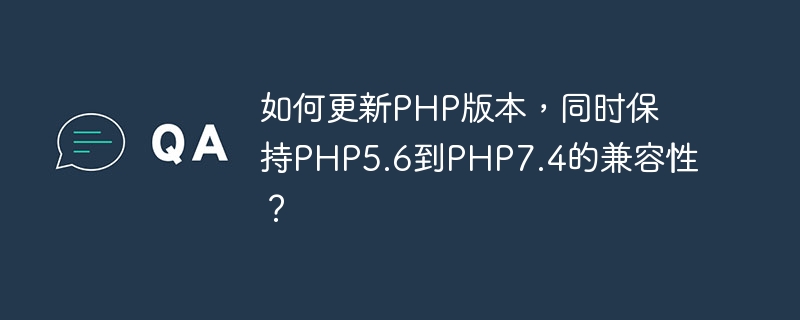

How to update the PHP version while maintaining compatibility from PHP5.6 to PHP7.4?
Abstract:
PHP is a widely used scripting language for developing web applications. As PHP versions are constantly updated, developers need to keep their PHP versions updated to enjoy new features and performance improvements. However, updating the PHP version may cause some existing code to be no longer compatible, so some techniques are needed to ensure a smooth transition. This article will introduce best practices for updating PHP versions and provide some code examples to help you maintain compatibility from PHP5.6 to PHP7.4.
php -l command to check the syntax errors of the code, use the phpcs tool to check the code standardization, and use the phpmd tool to check the code. Maintainability. With the support of these tools, you can find and solve some common problems, such as deprecated functions or methods, outdated syntax, etc. mysql extension instead of mysqli extension, use json_decode_array function instead of json_decode function, etc. Through these compatibility extensions, you can port older versions of code to newer versions of PHP without making too many changes. The following is a sample code that shows how to make a simple database connection function compatible between PHP5.6 and PHP7.4:
function connect_database() {
if (version_compare(phpversion(), '7.0', '<')) {
$conn = mysql_connect('localhost', 'username', 'password');
} else {
$conn = mysqli_connect('localhost', 'username', 'password');
}
return $conn;
}In the above example, we Use the version_compare function to check if the PHP version is less than 7.0. If so, we use the mysql_connect function to connect to the database; otherwise, we use the mysqli_connect function to connect to the database. In this way, we can successfully connect to the database in different versions of PHP.
Summary:
Updating your PHP version is an important task that allows your application to benefit from new features and performance improvements. However, updating PHP versions may cause some existing code to become incompatible. By using the best practices and compatibility tools mentioned above, you can maintain compatibility as much as possible from PHP 5.6 to PHP 7.4 and ensure a smooth transition. Remember, during the update process, back up the code in time and conduct sufficient testing to ensure the stable operation of the system.
The above is the detailed content of How to update PHP version while maintaining compatibility from PHP5.6 to PHP7.4?. For more information, please follow other related articles on the PHP Chinese website!